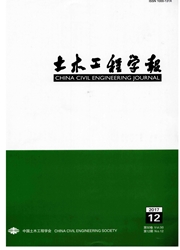

 中文摘要:
中文摘要:
对节点区柱钢管不贯通式钢管混凝土柱-梁节点进行6个试件的低周反复荷载试验,研究此类型节点的抗震力学性能。研究表明在不同的配筋情况下,试件表现出环梁外框架梁破坏、环梁与梁交界处破坏及环梁内破坏的3种破坏形态。从滞回曲线、骨架曲线、应变分析、延性、强度刚度退化、能量耗散能力等方面对试验结果进行讨论。结果表明通过合理配筋,可使得此类型节点具有良好的抗震性能。采用"强节点弱梁"原则设计的节点,延性系数均大于2.9,强度退化系数均大于0.96,环线刚度曲线呈下凹型趋于收敛,归一化滞回耗能也均大于3.3。而"强梁弱节点"试件S3,其滞回曲线出现较明显的捏缩现象,延性系数为2.2,加载后期强度退化系数下降到0.78。"节点较弱"的S5试件,其性能介乎前两者之间。
 英文摘要:
英文摘要:
In order to investigate the seismic behavior of concrete filled steel tubular column-beam joint with discontinuous column tube in the joint zone,six specimens were tested under cyclic loading. The results show that three failure modes may appear for different steel ratios,with the first being failure at the frame beam outside the ring beam,the second being failure at the connection of frame beam and ring beam,and the third being failure in the ring beam. Experimental results are discussed in various aspects,such as hysteresis loop,skeleton curve,strain,ductility,strength degradation,stiffness degradation and energy dissipation. This study shows that proper steel configuration for the joint may lead to desirable seismic behavior. For specimens designed with the "strong joint and weak beam" principle,the ductility factors are greater than 2.9,the strength degradation coefficients are greater than 0.96,the stiffness curves are concave and convergent,and the relative energy dissipation coefficients are greater than 3.3. However,for specimens designed under the principle of "strong beam weak joint",an evident pinch appears in the hysteresis loop,the ductility factor is 2.2,and the strength degradation coefficient decreases to 0.78 in the later period of loading. The behavior of the "weak joint" specimen is between the former two types of specimens.
 同期刊论文项目
同期刊论文项目
 同项目期刊论文
同项目期刊论文
 期刊信息
期刊信息
